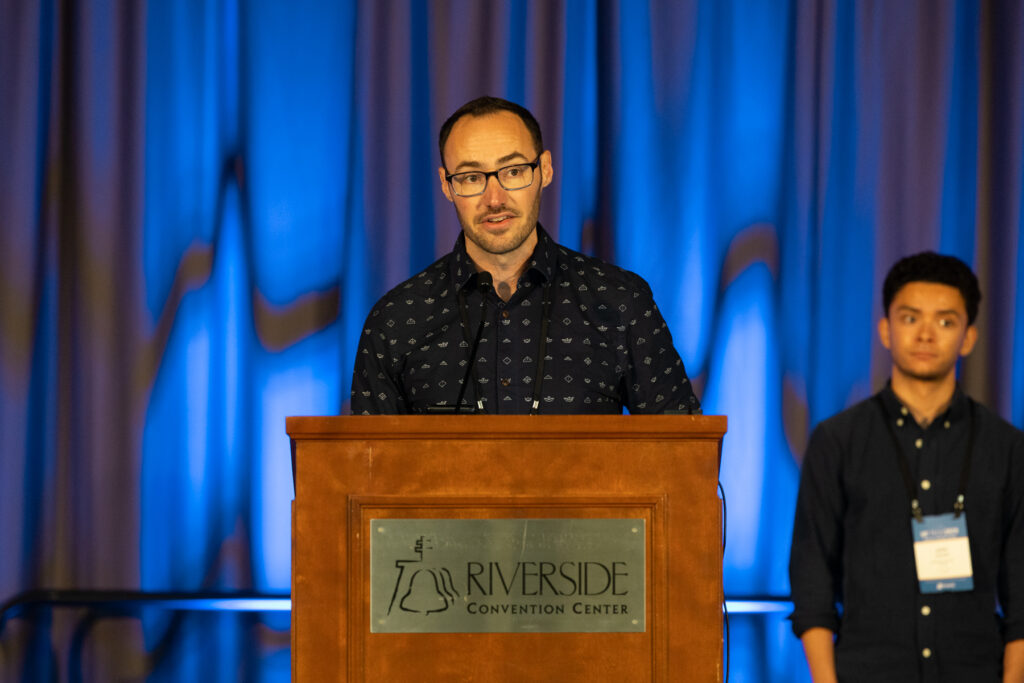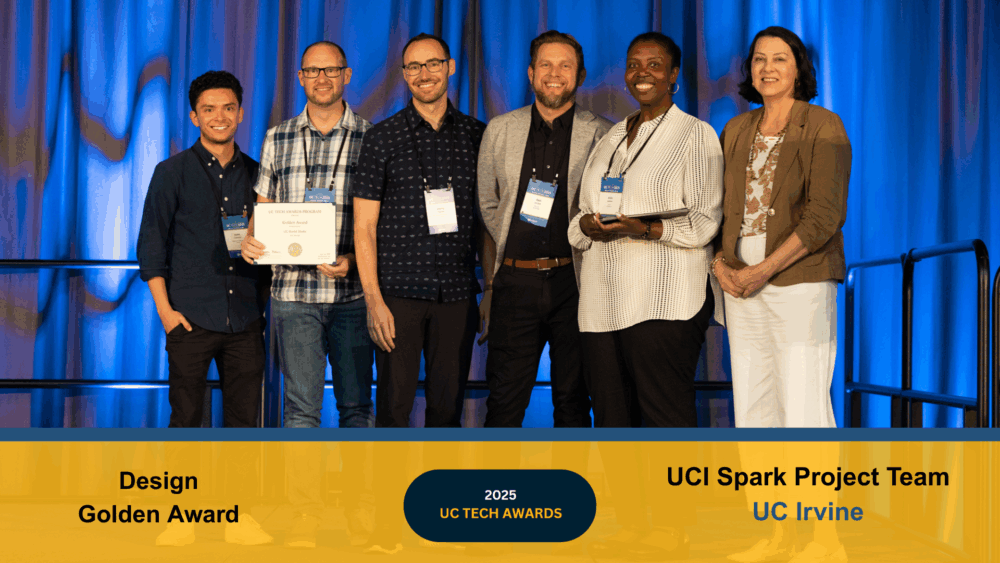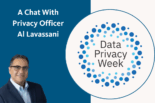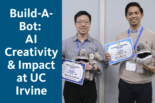Overview
The UC Irvine (UCI) project team won the Gold Design Award at the 2025 UC Tech Awards for their work on UCI Spark, a first-of-its-kind student success application. UCI Spark leverages user-centered design, new methods of data integration and governance, and ongoing campuswide collaboration to provide tailored support for a diverse student body, helping students reach their personal definition of success.
The Challenge
In the ever-evolving landscape of higher education, UC Irvine faced a complex challenge: how to effectively support its diverse student population with tailored resources and interventions. The journey to create Spark began two years ago, born from the recognition that UCI’s student body is a vibrant tapestry of backgrounds, experiences, and needs. For example, 49% of UC Irvine students are first-generation college students and UC Irvine is designated as a Hispanic, Asian American, and Native American serving institution. Traditional catch-all approaches to student support were no longer sufficient.
The Approach

The solution came in the form of an innovative tool called Spark, designed to leverage data and technology to provide personalized support for each student’s unique needs. UCI Spark presents students with a personalized dashboard that suggests campus resources and opportunities (ranging from tutoring to career coaching) that are targeted to meet their unique needs via institutional data including demographics, enrollment, academic performance, and time of year.
This tailored experience assures students that what they see in Spark is fit for them, cutting through the noise of traditional email outreach and uncovering opportunities to engage with the campus that might not have otherwise been found. Further, Spark provides Canvas Learning Management System (LMS) activity analytics to help students strategize their approach for reaching their personal academic goals and to encourage them towards evidence-backed studying practices.
Challenges
The development of Spark was not without its challenges.
- Historically, student data at UC Irvine had been scattered across various departments and systems, creating information silos that hindered comprehensive support efforts. However, the advent of the Comprehensive Analytics for Student Success (UCI Compass) initiative, which seeks to enhance our data-driven insights, and access to the Unizin Data Platform, a tool from the Unizin consortium of higher-ed institutions that brings together previously siloed information, presented a new opportunity to leverage a convergence of student data — an opportunity that Spark leapt on.
- What sets Spark apart from other tools in its category is its innovative focus on holistic wellness and student self-determination of “success.” This unique approach means that there was no existing template to follow, requiring the team to chart new territory in student success technology.
- The team also faced potential resistance from students and faculty regarding the novel use of institutional data, including LMS activities. There were concerns about privacy and the risk of unintended consequences, such as potentially demotivating students, if not implemented carefully.
User-Centered Design Approach
To address these challenges, the Spark team embarked on a user-centered research process.
- They conducted in-depth studies on student preferences and needs, including both cohort dynamics research and individual student interviews. Early prototypes underwent rigorous usability testing, and student co-design sessions were led in partnership with the School of Education. Throughout the development process, the team sought feedback from student success experts, including advisors, faculty, and student service providers.
- To ensure that Spark could meet the diverse needs of UCI’s student population, an “Empowerment Library Workgroup” was established. This group of 20 individuals, including advisors, student service providers, faculty, students, and the development team, worked tirelessly to identify resources, determine how to target them to students effectively, and provide feedback on framing to make opportunities attractive and engaging.
- The team also prioritized student safety and privacy. They participated in developing governance via the Student Data Warehouse governance group and sought feedback from campus experts on supporting underrepresented minority students to ensure that content would be positive and motivating. They connected with numerous groups around campus to introduce the tool early in its development and seek feedback, ensuring transparency and building trust.
The Rollout
Beginning in January 2025, Spark’s rollout was carefully orchestrated, introducing it gradually one quarter at a time. The team closely monitored usage and actively sought student feedback to ensure there were no unintended negative effects. They analyzed usage analytics and conducted surveys to quickly identify strengths and weaknesses, allowing for rapid iteration and improvement.
The Impact
The results of these efforts have been promising. Although Spark is still in its early stages, it has already shown signs of success. Usership of the tool closely mirrors the campus distribution across gender, first-generation, and low-income populations, falling within a 10% margin. This indicates that Spark is reaching and serving a diverse cross-section of the student body as intended.
A post-quarter survey conducted in the fall revealed encouraging feedback. Sixty-eight percent of respondents indicated that the resources shown to them through Spark were relevant and helpful. Perhaps even more importantly, 59% of respondents reported that Spark led them to make positive changes in their class participation. These early results suggest that Spark is not only providing valuable resources but also inspiring concrete actions that can improve students’ academic experiences.
Importantly, the careful and considerate approach to Spark’s development and implementation has paid off in terms of community acceptance. To date, no serious concerns have been raised about the tool’s implementation or impact by any faculty or students, a testament to the thorough planning and stakeholder engagement throughout the process.
Why It Matters
The development and implementation of Spark align closely with UCI’s mission of serving the people of California and the world. By creating a tool that provides personalized support to a diverse student body, UC Irvine is enhancing educational outcomes and promoting student success on an individual level. The potential for Spark to be shared with other institutions further extends its impact, potentially benefiting students far beyond the UC Irvine campus.
As Spark continues to evolve, it stands as a shining example of how technology, data, and a deep commitment to student success can come together to create innovative solutions in higher education. The journey of Spark from concept to reality demonstrates UCI’s dedication to pushing the boundaries of what’s possible in student support, always with an eye toward serving its diverse community and fostering academic success for all.
Meet the Award-Winning Team
Team Name: UCI Spark Project Team
Award Category: Design
Location: UC Irvine
2025 Gold Design Award Winners:
- Jeremy Thacker – Assistant Director, Educational & Student Success Technologies, OIT, UC Irvine
- Ray Vadnais – Senior User Experience Architect, OIT, UC Irvine
- Bee Walden – Associate Director, Student & Academic Services, OIT, UC Irvine
- Michael Walton – Manager, Student Success Technologies
- Justin Camacho – Applications Programmer, OIT, UC Irvine
- Mark Arnold – Senior Data Architect, OIT, UC Irvine
- Durendal Huynh – Programmer Analyst, OIT, UC Irvine
- Alissa Powers – Web Application Developer, OIT, UC Irvine
- Nick Ayo – Technical Project Manager, OIT, UC Irvine
- Emily Young – Support Specialist, OIT, UC Irvine
- Cydney Palecek – Senior Application Support Specialist, OIT, UC Irvine
Read More
Read the team’s complete UC Tech Awards application
Learn more about the UC Tech Awards Program
Contact

Director of Communications
UC Irvine
[Cover image and event photo of Jeremy Thacker, Justin Camacho and Michael Walton, with CIO’s Matthew Gunkel, Aisha Jackson and Molly Greek, courtesy of Andrew Castro]







